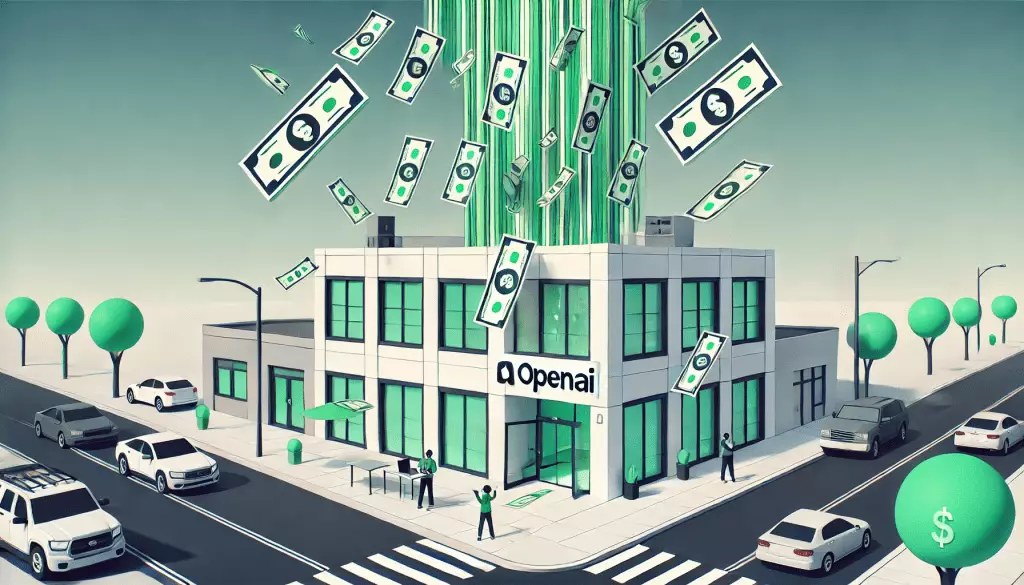In a striking announcement, OpenAI revealed that it has successfully completed a monumental funding round, amassing $6.6 billion, which elevates the company’s total valuation to an astounding $157 billion. This remarkable feat is now recognized as the largest venture capital funding round in history, surpassing previous records and setting new benchmarks for the tech industry. However, while the financial success is undeniable, the announcement comes amid growing concerns about OpenAI’s leadership stability and its long-term viability in an increasingly competitive landscape.
The funding round, predominantly led by Thrive Capital and complemented by significant investments from giants like Nvidia and Microsoft, signals a strategic push to reinforce its dominance in the field of artificial intelligence. OpenAI highlighted on its official platforms that their flagship product, ChatGPT, boasts an impressive 250 million unique users weekly. The company asserted that this influx of capital would significantly bolster their capabilities in frontier AI research and expand their computational resources, facilitating the continued development of innovative solutions to complex challenges.
However, it is essential to approach this narrative with caution. Critics of OpenAI have voiced skepticism regarding its business model and sustainability. Prominent tech commentators attribute this skepticism to OpenAI’s recent choice to accept funding from the controversial Softbank Venture Fund, known for its history of investing in companies that have struggled to deliver on their promises, such as WeWork. Additionally, the heavy reliance on individual subscriptions for ChatGPT, rather than a robust model centered around API usage or licensing, raises troubling questions about the firm’s profitability in the cutthroat AI market.
The cloud of uncertainty surrounding OpenAI is further compounded by notable executive departures, including that of Mira Murati, former chief technology officer. Such exits may imply systemic issues within the organization that could hinder its growth trajectory or erode investor confidence. The absence of some of its founding minds raises profound concerns about the company’s strategic vision and ability to stay ahead of emerging competitors, particularly as some suggest that Apple’s consideration for investing concluded without a commitment amidst these recent departures.
Adding to the intrigue, reports surfaced from The Financial Times indicating that part of the conditions for investors included a clause preventing them from backing competitors such as Anthropic and xAI, a company founded by Elon Musk that has made headlines for advancing its technology rapidly. This move could suggest OpenAI’s anxiety regarding the growing capabilities of its rivals and its determination to maintain a market edge, but it could also be viewed as an overreach in a rapidly evolving sector.
As AI technologies continue to proliferate, competition within the sector is intensifying. New entrants, like Liquid AI with its innovative Liquid Foundation Models, promise alternatives to conventional architectures, while industry stalwarts like Google and Anthropic step up their game by refining their offerings. Moreover, organizations such as Meta and Alibaba are set to disrupt the market with powerful open-source models made available for free, effectively lowering the barrier to entry for new participants.
In this bustling arena, OpenAI has historically excelled, often topping performance benchmarks with its models. Whenever competitors gain ground, OpenAI swiftly responds with updates and new iterations of its offerings, ensuring it remains relevant. Coupled with its recent funding and a commitment to enhance its analytics services and developer tools, the company appears poised to weather the storm for the foreseeable future.
The infusion of $6.6 billion into OpenAI’s operations is undoubtedly a substantial boost for its ambitions. However, one cannot overlook the ongoing scrutiny of its business model, especially in light of its creative endeavors, like the GPT Store. This AI app store aims to empower users to develop and share custom ChatGPT applications. With promising revenue-sharing prospects announced at the recent DevDay developer conference, the community eagerly anticipates seeing how OpenAI will nurture this platform moving forward—most notably if financial incentives can be expanded to a wider range of developers.
Ultimately, while OpenAI’s latest funding round is a testament to its established position in the AI field, several hurdles are yet to be addressed. The need for strategic clarity, consistent leadership, and a viable business model will be instrumental in determining whether OpenAI can maintain its supremacy in a space brimming with innovation and competition. As the dust settles from this financial victory, the industry watches closely, eager to gauge what lies ahead for this AI powerhouse.

